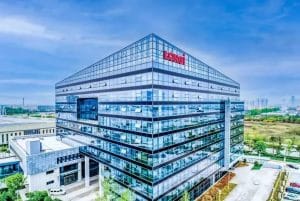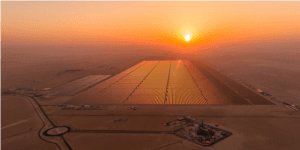After breaking below the cash cost line for enterprises, the prices across the entire photovoltaic (PV) industry chain have shown signs of stabilization. However, it is still too early to say that a turning point in pricing has been reached. The mismatch between supply and demand caused by the aggressive expansion of both new and established players in the industry remains a key factor limiting price increases.
From a policy perspective, the substantial demand for PV installations driven by the “dual carbon” strategy in 2020 has unleashed strong buyer demand, leading to a severe supply-demand imbalance in the upstream silicon material segment in 2021 and 2022. This directly fueled a bullish market for polysilicon in 2022.
Statistics show that by 2021, China’s nominal polysilicon production capacity stood at 599,500 tons, primarily concentrated among global CR5 manufacturers such as Tongwei Co., Ltd., GCL-Poly Energy, TBEA, Dongfang Hope, and Daqo New Energy. Although companies like Asia Silicon, China Silicon Corporation, Dongli Photovoltaics, Jingguang Silicon, and Nanjing Glass A also have some production capacity, it is insufficient to meet the robust market demand.
Lorem ipsum dolor sit amet, consectetur adipiscing elit. Ut elit tellus, luctus nec ullamcorper mattis, pulvinar dapibus leo.
2021-2022 Polycrystalline Silicon Production Capacity Statistics
| Company Name | 2021 Production Capacity | 2022 Production Capacity |
|---|---|---|
| Tongwei Co., Ltd. | 180,000 tons | 330,000 tons |
| GCL-Poly Energy Holdings Limited | 104,500 tons | 185,000 tons |
| TBEA (China Transformer Company) | 66,000 tons | 120,000 tons |
| East Hope Group | 70,000 tons | 130,000 tons |
| Xinjiang Daqo New Energy Co.,Ltd. | 105,000 tons | 105,000 tons |
| Asia Silicon(Qinghai)Co., Ltd. | 20,000 tons | 90,000 tons |
| LIHAO SEMICONDUCTOR | 0 tons | 50,000 tons |
| SINOSICO | 20,000 tons | 20,000 tons |
| Inner Mongolia Dongli Solar Co., Ltd | 12,000 tons | 12,000 tons |
| Juguang Silicon | 12,000 tons | 12,000 tons |
| Csg Holding Co.,Ltd. | 10,000 tons | 10,000 tons |
| Geely Silicon Valley | 0 tons | 2,000 tons |
Due to the relatively small overall production capacity and the fact that the import share cannot cover the demand, it has become the motivation for “owning silicon as the king”, thus increasing the enthusiasm for expanding polysilicon production.
In 2022, with the implementation of some new projects, the shortage of polysilicon supply has eased. According to statistics from “Grassroots Photovoltaic”, by the end of 2022, the nominal production capacity of polysilicon has reached 1.066 million tons, an increase of 77.81% over 2021.
The new production capacity is still mainly concentrated in the hands of CR5 manufacturers such as GCL Group, Tongwei Co., Ltd., TBEA, Daquan Energy and Oriental Hope. The new polysilicon power is Qinghai Lihao. Its Xining 50,000-ton project took only 12 months from start to production, which is about half a year less than the average production period of 15-18 months.
Due to the concentrated production of new projects in 2021 and 2022, 2023 will become the peak period for the landing of polysilicon production capacity. By the end of 2023, 21 domestic manufacturers will have built polysilicon production capacity of 2.658 million tons, of which the top 10 manufacturers will have built a total capacity of 2.27 million tons.
| Company Name | Production capacity in 2023 | Production capacity in 2024 | Capacity Planning |
|---|---|---|---|
| Tongwei Co., Ltd. | 450,000 tons | 400,000 tons | 1,200,000 tons |
| GCL-Poly Energy Holdings Limited | 420,000 tons | 500,000 tons | 1,000,000 tons |
| TBEA (China Transformer Company) | 300,000 tons | 300,000 tons | 500,000 tons |
| East Hope Group | 255,000 tons | 405,000 tons | 500,000 tons |
| Xinjiang Daqo New Energy Co.,Ltd. | 205,000 tons | 100,000 tons | 405,000 tons |
| Hoshine Silicon Industry Co.,Ltd | 200,000 tons | 200,000 tons | 300,000 tons |
| LIHAO SEMICONDUCTOR | 150,000 tons | 100,000 tons | 500,000 tons |
| Xinjiang Qiya Silicon Industry Co., Ltd | 100,000 tons | 150,000 tons | 400,000 tons |
| Qingdian Silicon | 100,000 tons | 100,000 tons | 200,000 tons |
| Asia Silicon(Qinghai)Co., Ltd. | 90,000 tons | 100,000 tons | 290,000 tons |
| Inner Mongolia Dongli Solar Co., Ltd | 68,000 tons | 68,000 tons | 450,000 tons |
| Hongyuan Green Energy Co., Ltd. | 50,000 tons | 50,000 tons | 100,000 tons |
| Jiangsu Runergy New Energy Technology Co., Ltd. | 50,000 tons | 50,000 tons | 200,000 tons |
| Geely Silicon Valley | 50,000 tons | 100,000 tons | 200,000 tons |
| Juguang Silicon | 12,000 tons | 50,000 tons | 150,000 tons |
| Jingnuo New Energy | 50,000 tons | 50,000 tons | 100,000 tons |
| Csg Holding Co.,Ltd. | 10,000 tons | 50,000 tons | 60,000 tons |
| Saineng Silicon | 0 tons | 20,000 tons | 100,000 tons |
| Ningxia Baofeng Energy Group Co., Ltd. | 50,000 tons | 50,000 tons | 300,000 tons |
| Xinyi Group | 0 tons | 0 tons | 200,000 tons |
| SINOSICO | 20,000 tons | 20,000 tons | 100,000 tons |
| shanxi non-ferrous tianhong rico silicon co . ltd | 18,000 tons | 20,000 tons | 80,000 tons |
| Trina Solar Limited | 0 tons | 0 tons | 150,000 tons |
| Canadian Solar Inc. | 0 tons | 0 tons | 200,000 tons |
| China Risun Group Limited | 0 tons | 0 tons | 120,000 tons |
| Xinjiang Jinghui Energy | 0 tons | 0 tons | 200,000 tons |
| Laibao Group | 0 tons | 0 tons | 100,000 tons |
| Synergy Group | 0 tons | 0 tons | 150,000 tons |
| LINKSUN Silicon | 10,000 tons | 70,000 tons | 100,000 tons |
| Hongling Silicon Materials (Urumqi) Co., Ltd | 0 tons | 100,000 tons | 100,000 tons |
In this wave of expansion, the global CR5 is still the main force, while second- and third-tier manufacturers and new forces are beginning to come to the fore. For example, Qinghai Lihao has already put into production a 150,000-ton project, locking in the top 10 global polysilicon production capacity. Another polysilicon dark horse and new industry force has simultaneously locked in the top 10 global polysilicon production capacity with a 100,000-ton project, and has gained a firm foothold in this round of polysilicon production capacity “positioning war”.
At the same time, another company that has expanded its production is Hesheng Silicon Industry, which started with industrial silicon. According to the investment plan, Hesheng in the central part is expected to put into production a 200,000-ton project in 2023, and Hesheng in the eastern part will also put into production a 200,000-ton project in the first half of 2024. However, due to the drastic changes in the market situation, the time for the Hesheng project to be put into production has been delayed.
Hongyuan Green Energy, Runyang Co., Ltd., Qingdian Silicon Industry, Geely Silicon Valley, Jingnuo New Energy and Baofeng Energy have also successfully seized the polysilicon market with the implementation of new projects.
According to the disclosed expansion plan, 2023-2024 will be the peak years for polysilicon projects. After about 1.592 million tons of new production capacity is put online in 2023, about 1.18 million tons of new production capacity will be put on the market in 2024.
Tongwei Baoshan 200,000 tons + Baotou 200,000 tons, GCL 80,000 tons of granular silicon, Eastern Hesheng 200,000 tons, Daquan Baotou Phase II 100,000 tons, Oriental Hope about 150,000 tons, Asia Silicon Haidong 100,000 tons, CSG A Qinghai Haixi 50,000 tons, Geely Silicon Valley Ningxia 100,000 tons and other projects will be put on the market this year.
At present, there are doubts about whether the 100,000-ton project of Qinghai Lihao Yibin will be put into production as scheduled. Earlier, there was news that the project had started and would be put into production in August 2024, but Qinghai Lihao announced that it would invest in a 200,000-ton polysilicon project in Baotou. The progress of the construction of the 100,000-ton project in Yibin on the Internet is not clear.
If the 1.18 million-ton new project is put into production as scheduled this year, the nominal production capacity of polysilicon will reach 3.838 million tons by the end of 2024, just one step away from the 4 million-ton mark.
Through the data, it can be intuitively found that in just three years from the end of 2021 to the end of 2024, the polysilicon production capacity will increase from 599,500 tons to 3.838 million tons, bringing a new increase of 3.2385 million tons, an increase of about 540%, and an average annual increase of more than 1 million tons.
According to the production capacity planning disclosed by relevant manufacturers, the total production capacity planning of more than 30 polysilicon companies in the industry has reached 8.27 million tons. Excluding completed projects, including the 100,000 projects terminated by Zhonglai Co., Ltd., the capacity of projects under construction and to be built is still 5.26 million tons.
In other words, after the capacity planning of relevant manufacturers is fully implemented as scheduled, the polysilicon market will have a new increase of 5.26 million tons in the future. With the existing capacity of 3.838 million tons, the total capacity planning of domestic polysilicon is about 9.09 million tons.
Obviously, in the short term, such a huge capacity scale far exceeds the market demand released by the dual-carbon strategy, and a large part of the expansion plan will not be implemented.
Polysilicon is a link with high investment and technical thresholds and long-term investment, which is comparable to the low threshold of non-component links. This determines that the players who enter this field are all powerful large companies that have strong ability to resist the cold winter and cross the cycle.


